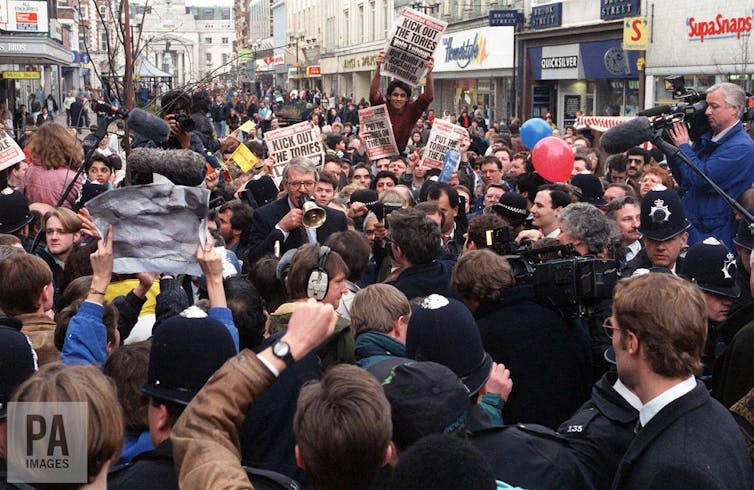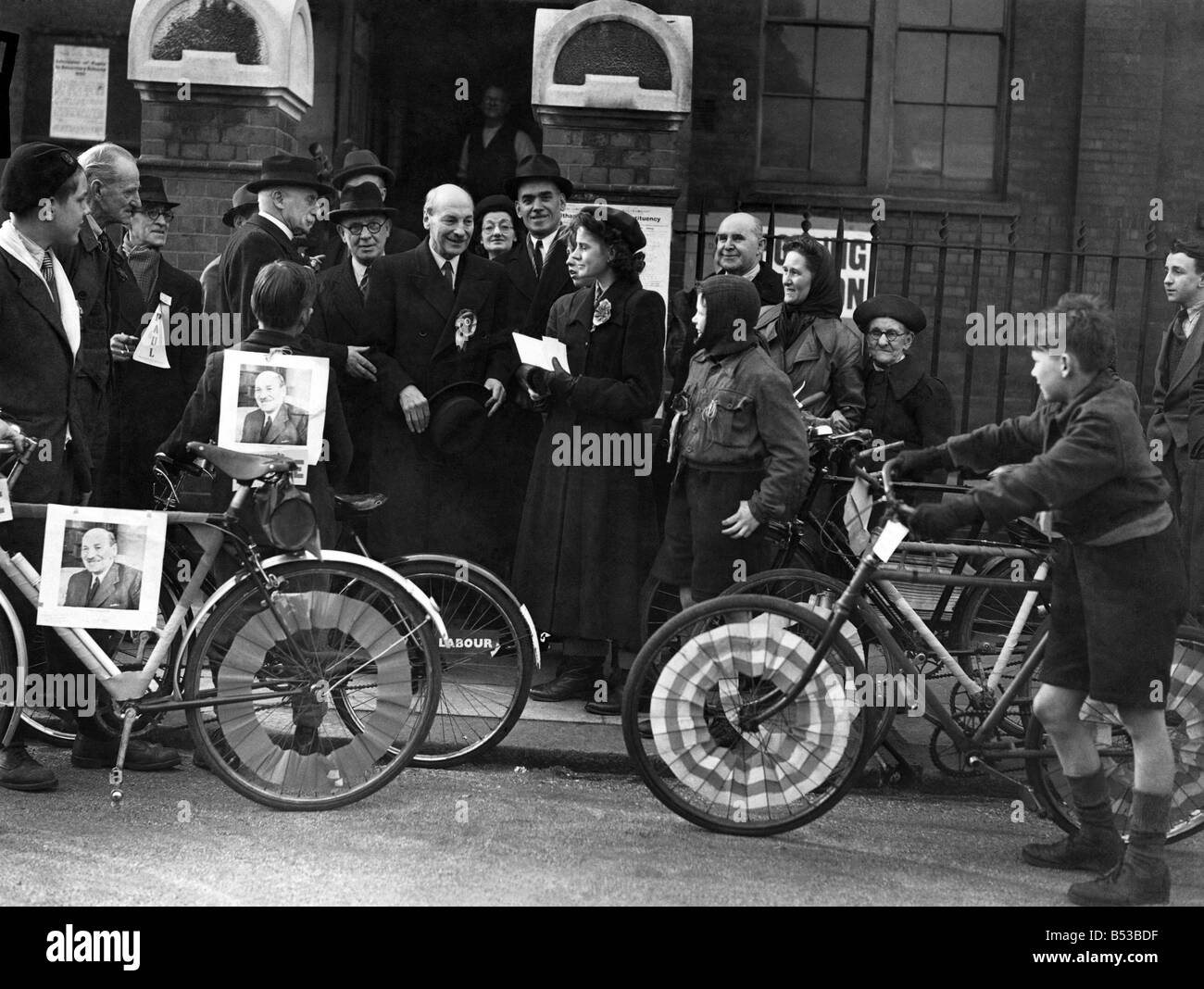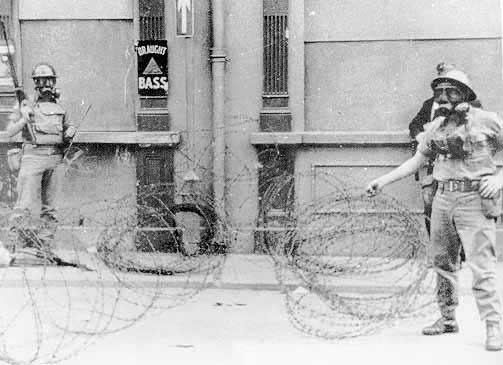Labour are pushing for a divisive second referendum which rips up their manifesto pledge to respect the result of the largest democratic exercise in our nation’s history and would take us back to square one.
The wisdom of Brandon Lewis, Tory MP and Home Office minister, there. It is a claim you hear a lot now. The UK's decision to leave the EU was a democratic exercise like no other, unparalleled in its scope and size, and so we absolutely must go along with it.
Luckily, this is very easy to test. There are two ways to gauge the size of an election. The turnout, and the number of votes cast. Here are the figures for the EU referendum:
2016 EU membership- 72.2%, 33,577,342
Sounds a lot, especially when compared to the only two other UK-wide referendums ever held:
1975 EEC membership- 64.6%, 25,903,194
2011 Alternative Vote- 42.2%, 19,279,022
Hands down, then. Brexit wins. It is miles clear in terms of both turnout and number of votes cast.
But referendums are very rare political events in the UK. We are far, far more used to thinking of democracy in terms of general elections. And here the 2016 referendum starts to look less outstanding:
General elections, 1945-2017 (I picked '45 as it is when a recognisable political landscape emerged).
1945- 72.8%, 24,073,025
1950- 83.9%, 28,771,124
1951- 82.6%, 28,596,594
1955- 76.8%, 26,759,729
1959- 78.7%, 27,862,652
1964- 77.1%, 27,657,148
1966- 75.8%, 27,264,747
1970- 72.0%, 28,305,534
1974 (Feb)- 78.8%, 31,321,982
1974 (Oct)- 72.8%, 29.189,104
1979- 76.0%, 31,221,362
1983- 72.7%, 30,671,137
1987- 75.3%, 32,529,578
1992- 77.7%, 33,614,074
1997- 71.4%, 31,286,284
2001- 59.4%, 26,367,383
2005- 61.4%, 27,148,510
2010- 65.1%, 29,687,604
2015- 66.1%, 30,697,525
2017- 68.7%, 32,204,124
By this measure, the EU referendum is either the second largest democratic exercise in terms of raw number of votes cast (behind the 1992 election), or the 14th in terms of turnout (behind every post-war election apart from 1970, 2001, 2005, 2010, 2015, and 2017). It is impressive compared to recent participation in general elections. But it hardly seems worth being the hill that we die on as a nation.
There is another claim that is made, that the Brexit vote represents the largest mandate for anything in British democratic history. This seems more credible. Certainly, more people voted for Brexit than for any other single option. But, it is very hard to compare the mandates received from general elections to one that is derived from a referendum. General elections produce majorities in the House of Commons, referendums do not. Prime Ministers do also receive shares of the vote, and total number of votes, but these reflect the multiple choices on offer across the UK. John Major holds the record for the most votes cast for his party, at 14 million in 1992, but this translated into 41.9% of the vote. The largest post-war vote share was Anthony Eden in 1955, at 49.7%, but was 'only' 13.3 million votes (fewer than both Labour and the Tories at the previous election).
Referendums are generally measured on the size of the winning vote share; the greater the winning vote share, the better the result, the more legitimacy it contains. And now 2016 is looking like it is in serious trouble:
1975 EEC membership- Yes- 67.23%, No- 32.77%
2011 Alternative Vote- No- 67.9%, Yes- 32.1%
2016 EU membership- Leave- 51.89%, Remain- 48.11%
For the record, it doesn't stand up well against the sub-national referendums we've either:
1973 Northern Irish 'border poll' (on whether to unify with the Republic of Ireland)- Remain in the UK- 98.9%, Join with the Republic of Ireland- 1.1%
1979 Scottish devolution- Yes- 51.62%, No 48.38% (failed as the rules said a certain percentage of people needed to vote for it, and 51.6% was too low)
1979 Welsh devolution- No- 79.74%, Yes- 20.26%
1997 Scottish devolution- Yes- 74.29%, No- 25.71%
1997 Welsh devolution- Yes- 50.3%, No- 49.7%
1998 Northern Ireland Good Friday Agreement- Yes- 71.1%, No- 28.9%
2011 Welsh further powers devolution- Yes- 63.49%, No- 36.51%
2014 Scottish independence- No- 55.3%, Yes- 44.7% (Which, incidentally, saw a whopping 84.6% turnout, a level of participation way above that of even national elections in the 1950s).
So although more people voted for Brexit than any of the above, it does not command the same proportion of popular support as keeping Britain in the EEC, keeping first past the post, keeping Northern Ireland in the UK, enacting or furthering Scottish and Welsh devolution, keeping Scotland in the UK, or signing the Good Friday Agreement. It has the third weakest mandate of the UK's referendums, coming ahead only of implementing Welsh devolution in 1997 and Scottish devolution in 1979. The 2016 Brexit vote was 27.9 percentage points behind the largest mandate, rejecting Welsh devolution in 1979. Ironically, this is an issue that the electorate were allowed to change their minds on. (Leaving out the extraordinary vote on the Northern Irish border in 1973, where the poll was boycotted by nationalists, so those voting those who'd vote for heavily for the Union anyway).
Ironically, the Brexit vote is highly likely to undo many of these policies, as leaving the EU is likely to trigger Scottish independence and destroy the Good Friday Agreement, potentially leading to a united Ireland. Despite those things arguably having a greater popular mandate than Brexit.
As a final aside, it turns out that the policy which has the second most votes ever in British history is the decision to remain a member of the EEC, from the 1975 referendum. In fact, the difference between the two is a pathetic 32,000 odd votes. And yes, I hope the colossal irony is not lost that the 2016 referendum marks an overturning of the wishes of voters from 1975. In what could be called a second referendum on the same subject.
To finish. The 2016 referendum is not the largest democratic exercise in British history, neither in terms of turnout nor of raw votes cast; those belong to the 1950 and 1992 elections respectively. It is more accurate to say that more people voted for Brexit as a single option. But how this translates into a mandate is a tricky bit of political science. And shouldn't be bandied about carelessly. Especially when other decisions, decisions that were endorsed by separate referendums, are going to be torn up as a result.
I'll leave you with the strangest fact of all. The UK's largest democratic exercise ever was the 1992 election, with the most votes cast, and a record 14 million votes for the winning Conservatives. There is something disconcerting that, if we applied the logic of the 2016 referendum to general elections, John Major would still be Prime Minister today.
The idea for this blog came from this article: https://fullfact.org/europe/eu-referendum-not-largest-democratic-exercise/
2016 EU membership- 72.2%, 33,577,342
Sounds a lot, especially when compared to the only two other UK-wide referendums ever held:
1975 EEC membership- 64.6%, 25,903,194
2011 Alternative Vote- 42.2%, 19,279,022
Hands down, then. Brexit wins. It is miles clear in terms of both turnout and number of votes cast.
But referendums are very rare political events in the UK. We are far, far more used to thinking of democracy in terms of general elections. And here the 2016 referendum starts to look less outstanding:
General elections, 1945-2017 (I picked '45 as it is when a recognisable political landscape emerged).
1945- 72.8%, 24,073,025
1950- 83.9%, 28,771,124
1951- 82.6%, 28,596,594
1955- 76.8%, 26,759,729
1959- 78.7%, 27,862,652
1964- 77.1%, 27,657,148
1966- 75.8%, 27,264,747
1970- 72.0%, 28,305,534
1974 (Feb)- 78.8%, 31,321,982
1974 (Oct)- 72.8%, 29.189,104
1979- 76.0%, 31,221,362
1983- 72.7%, 30,671,137
1987- 75.3%, 32,529,578
1992- 77.7%, 33,614,074
1997- 71.4%, 31,286,284
2001- 59.4%, 26,367,383
2005- 61.4%, 27,148,510
2010- 65.1%, 29,687,604
2015- 66.1%, 30,697,525
2017- 68.7%, 32,204,124
By this measure, the EU referendum is either the second largest democratic exercise in terms of raw number of votes cast (behind the 1992 election), or the 14th in terms of turnout (behind every post-war election apart from 1970, 2001, 2005, 2010, 2015, and 2017). It is impressive compared to recent participation in general elections. But it hardly seems worth being the hill that we die on as a nation.
There is another claim that is made, that the Brexit vote represents the largest mandate for anything in British democratic history. This seems more credible. Certainly, more people voted for Brexit than for any other single option. But, it is very hard to compare the mandates received from general elections to one that is derived from a referendum. General elections produce majorities in the House of Commons, referendums do not. Prime Ministers do also receive shares of the vote, and total number of votes, but these reflect the multiple choices on offer across the UK. John Major holds the record for the most votes cast for his party, at 14 million in 1992, but this translated into 41.9% of the vote. The largest post-war vote share was Anthony Eden in 1955, at 49.7%, but was 'only' 13.3 million votes (fewer than both Labour and the Tories at the previous election).
Referendums are generally measured on the size of the winning vote share; the greater the winning vote share, the better the result, the more legitimacy it contains. And now 2016 is looking like it is in serious trouble:
1975 EEC membership- Yes- 67.23%, No- 32.77%
2011 Alternative Vote- No- 67.9%, Yes- 32.1%
2016 EU membership- Leave- 51.89%, Remain- 48.11%
For the record, it doesn't stand up well against the sub-national referendums we've either:
1973 Northern Irish 'border poll' (on whether to unify with the Republic of Ireland)- Remain in the UK- 98.9%, Join with the Republic of Ireland- 1.1%
1979 Scottish devolution- Yes- 51.62%, No 48.38% (failed as the rules said a certain percentage of people needed to vote for it, and 51.6% was too low)
1979 Welsh devolution- No- 79.74%, Yes- 20.26%
1997 Scottish devolution- Yes- 74.29%, No- 25.71%
1997 Welsh devolution- Yes- 50.3%, No- 49.7%
1998 Northern Ireland Good Friday Agreement- Yes- 71.1%, No- 28.9%
2011 Welsh further powers devolution- Yes- 63.49%, No- 36.51%
2014 Scottish independence- No- 55.3%, Yes- 44.7% (Which, incidentally, saw a whopping 84.6% turnout, a level of participation way above that of even national elections in the 1950s).
So although more people voted for Brexit than any of the above, it does not command the same proportion of popular support as keeping Britain in the EEC, keeping first past the post, keeping Northern Ireland in the UK, enacting or furthering Scottish and Welsh devolution, keeping Scotland in the UK, or signing the Good Friday Agreement. It has the third weakest mandate of the UK's referendums, coming ahead only of implementing Welsh devolution in 1997 and Scottish devolution in 1979. The 2016 Brexit vote was 27.9 percentage points behind the largest mandate, rejecting Welsh devolution in 1979. Ironically, this is an issue that the electorate were allowed to change their minds on. (Leaving out the extraordinary vote on the Northern Irish border in 1973, where the poll was boycotted by nationalists, so those voting those who'd vote for heavily for the Union anyway).
Ironically, the Brexit vote is highly likely to undo many of these policies, as leaving the EU is likely to trigger Scottish independence and destroy the Good Friday Agreement, potentially leading to a united Ireland. Despite those things arguably having a greater popular mandate than Brexit.
As a final aside, it turns out that the policy which has the second most votes ever in British history is the decision to remain a member of the EEC, from the 1975 referendum. In fact, the difference between the two is a pathetic 32,000 odd votes. And yes, I hope the colossal irony is not lost that the 2016 referendum marks an overturning of the wishes of voters from 1975. In what could be called a second referendum on the same subject.
To finish. The 2016 referendum is not the largest democratic exercise in British history, neither in terms of turnout nor of raw votes cast; those belong to the 1950 and 1992 elections respectively. It is more accurate to say that more people voted for Brexit as a single option. But how this translates into a mandate is a tricky bit of political science. And shouldn't be bandied about carelessly. Especially when other decisions, decisions that were endorsed by separate referendums, are going to be torn up as a result.
I'll leave you with the strangest fact of all. The UK's largest democratic exercise ever was the 1992 election, with the most votes cast, and a record 14 million votes for the winning Conservatives. There is something disconcerting that, if we applied the logic of the 2016 referendum to general elections, John Major would still be Prime Minister today.
The true beneficiary of Britain's largest democratic exercise, campaigning in Luton, 1992
Clement Attlee voting in the 1950 election, which saw 83.9% of the electorate take part, the other contender for Britain's largest democratic exercise.
The idea for this blog came from this article: https://fullfact.org/europe/eu-referendum-not-largest-democratic-exercise/


